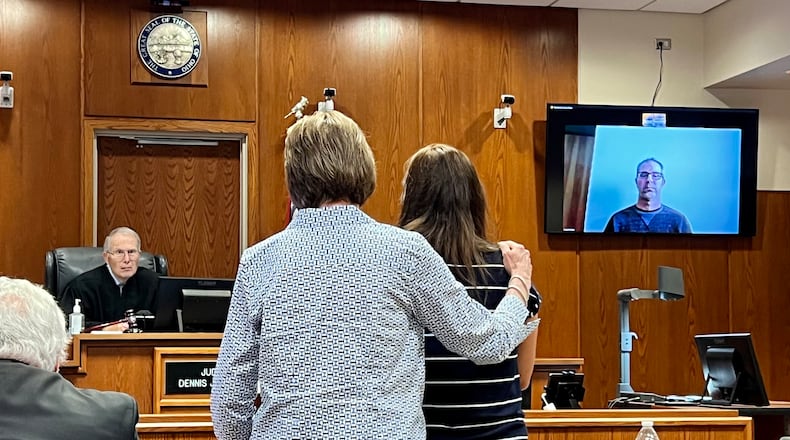Marlow, 43, has pleaded not guilty by reason of insanity to 12 aggravated murder charges, eight aggravated burglary charges and one count each of tampering with evidence and having weapons while under disability in the deaths of Clyde W. Knox, 82; his wife, Eva “Sally” Knox, 78; Sarah J. Anderson, 41; and her daughter, Kayla E. Anderson, 15.
Results from multiple psychological evaluations, including the most recent, which was the focus of Tuesday’s hearing, have argued Marlow is incompetent to stand trial.
Judge Dennis Adkins will consider the most recent report, submitted by Dr. Palak Shah from Summit Behavioral, along with testimony from Tuesday’s hearing, before handing down a decision about what’s next in Marlow’s case.
While at Summit, Marlow has received ongoing treatment for delusional disorder, a major mental illness.
Attending psychologists and psychiatrists, including Shah, who testified on Tuesday, have reported Marlow believes he’s being tormented by voices in his head that speak to him, court records show.
“He has delusional beliefs that he’s being telepathically tortured, and he reports hearing these telepathic voices all throughout the day,” Shah said during her video call testimony.
Shah said she’s working to determine the best treatment regimen for Marlow, which has involved testing multiple antipsychotic medications to see what works best to alleviate symptoms.
Shah testified Marlow has a calm demeanor overall but that he is often uncooperative with the treatment goals set by his team of doctors, which she says may be hindering his progress toward competency restoration.
“We recommend that he goes to psychotherapy groups and illness management groups, but he’s been refusing to go to those; he only goes to games groups,” Shah said. “He doesn’t have insight into his mental illness; he doesn’t believe he has a mental illness at all.”
Marlow has also been placed on “medication monitoring,” due to concerns of medication non-compliance, Shah testified, which means he is closely watched for 15 minutes after taking his medications to ensure he ingests them.
Members from both the Anderson and Knox families spoke Tuesday about the impact of the murders on their lives and the ongoing trauma.
Kathy Brockman, Sarah’s mother and Kayla’s grandmother, recounted walking into the home where Sarah and Kayla were killed, describing how even after the crime scene was cleaned, grim reminders of that day remained.
“I walked into their kitchen a few days after the murders and I saw Post-It notes on the kitchen cabinets. I asked about it and I was told, ‘We were covering up the bullet holes,’” she said. “Those bullets were meant for a 15-year-old girl who was just having lunch in what should have been the safety of her own home. How can this continue to go unaccounted for?”
Brockman also expressed doubts about Marlow’s incompetency status based in part on forensic evidence presented during a court hearing in December, including a forensic search of Marlow’s cellphone that showed web search history results from just days before the shooting which included questions about how long it takes police to establish a suspect following a crime, whether fugitives on the run should take the highway or back roads, how to get a job as a fugitive, whether cellphones can be tracked, and whether a defendant would benefit from pleading not guilty by reason of insanity, among other things.
Credit: Aimee Hancock
Credit: Aimee Hancock
“This shows he knows the difference between right and wrong and that there would be consequences for his actions; is he not participating in (therapies) because he knows that not being restored would play in his favor by not going to trial?” Brockman said. “Is he guilty of malicious incompetence, a deliberate tactic where a person pretends to be incompetent to avoid any responsibility? Is this by design?”
About the Author





